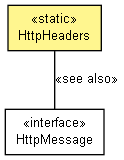 org.jboss.netty.handler.codec.http.HttpHeaders
org.jboss.netty.handler.codec.http.HttpHeaders
|
|||||||||
| 上一个类 下一个类 | 框架 无框架 | ||||||||
| 摘要: 嵌套 | 字段 | 构造方法 | 方法 | 详细信息: 字段 | 构造方法 | 方法 | ||||||||
java.lang.Objectorg.jboss.netty.handler.codec.http.HttpHeaders
public class HttpHeaders

Provides the constants for the standard HTTP header names and values and
commonly used utility methods that accesses an HttpMessage.
| 嵌套类摘要 | |
|---|---|
static class |
HttpHeaders.Names
Standard HTTP header names. |
static class |
HttpHeaders.Values
Standard HTTP header values. |
| 方法摘要 | |
|---|---|
static void |
addHeader(HttpMessage message,
java.lang.String name,
java.lang.Object value)
Adds a new header with the specified name and value. |
static void |
addIntHeader(HttpMessage message,
java.lang.String name,
int value)
Adds a new integer header with the specified name and value. |
static long |
getContentLength(HttpMessage message)
Returns the length of the content. |
static long |
getContentLength(HttpMessage message,
long defaultValue)
Returns the length of the content. |
static java.lang.String |
getHeader(HttpMessage message,
java.lang.String name)
Returns the header value with the specified header name. |
static java.lang.String |
getHeader(HttpMessage message,
java.lang.String name,
java.lang.String defaultValue)
Returns the header value with the specified header name. |
static java.lang.String |
getHost(HttpMessage message)
Returns the value of the "Host" header. |
static java.lang.String |
getHost(HttpMessage message,
java.lang.String defaultValue)
Returns the value of the "Host" header. |
static int |
getIntHeader(HttpMessage message,
java.lang.String name)
Returns the integer header value with the specified header name. |
static int |
getIntHeader(HttpMessage message,
java.lang.String name,
int defaultValue)
Returns the integer header value with the specified header name. |
static boolean |
is100ContinueExpected(HttpMessage message)
Returns true if and only if the specified message contains the
"Expect: 100-continue" header. |
static boolean |
isKeepAlive(HttpMessage message)
Returns true if and only if the connection can remain open and
thus 'kept alive'. |
static void |
set100ContinueExpected(HttpMessage message)
Sets the "Expect: 100-continue" header to the specified message. |
static void |
set100ContinueExpected(HttpMessage message,
boolean set)
Sets or removes the "Expect: 100-continue" header to / from the
specified message. |
static void |
setContentLength(HttpMessage message,
long length)
Sets the "Content-Length" header. |
static void |
setHeader(HttpMessage message,
java.lang.String name,
java.lang.Iterable<?> values)
Sets a new header with the specified name and values. |
static void |
setHeader(HttpMessage message,
java.lang.String name,
java.lang.Object value)
Sets a new header with the specified name and value. |
static void |
setHost(HttpMessage message,
java.lang.String value)
Sets the "Host" header. |
static void |
setIntHeader(HttpMessage message,
java.lang.String name,
int value)
Sets a new integer header with the specified name and value. |
static void |
setIntHeader(HttpMessage message,
java.lang.String name,
java.lang.Iterable<java.lang.Integer> values)
Sets a new integer header with the specified name and values. |
static void |
setKeepAlive(HttpMessage message,
boolean keepAlive)
Sets the value of the "Connection" header depending on the
protocol version of the specified message. |
| 从类 java.lang.Object 继承的方法 |
|---|
equals, getClass, hashCode, notify, notifyAll, toString, wait, wait, wait |
| 方法详细信息 |
|---|
public static boolean isKeepAlive(HttpMessage message)
true if and only if the connection can remain open and
thus 'kept alive'. This methods respects the value of the
"Connection" header first and then the return value of
HttpVersion.isKeepAliveDefault().
public static void setKeepAlive(HttpMessage message,
boolean keepAlive)
"Connection" header depending on the
protocol version of the specified message. This method sets or removes
the "Connection" header depending on what the default keep alive
mode of the message's protocol version is, as specified by
HttpVersion.isKeepAliveDefault().
"close" if keepAlive is false."keep-alive" if keepAlive is true.
public static java.lang.String getHeader(HttpMessage message,
java.lang.String name)
null if there is no such header
public static java.lang.String getHeader(HttpMessage message,
java.lang.String name,
java.lang.String defaultValue)
defaultValue if there is no such
header
public static void setHeader(HttpMessage message,
java.lang.String name,
java.lang.Object value)
public static void setHeader(HttpMessage message,
java.lang.String name,
java.lang.Iterable<?> values)
public static void addHeader(HttpMessage message,
java.lang.String name,
java.lang.Object value)
public static int getIntHeader(HttpMessage message,
java.lang.String name)
java.lang.NumberFormatException - if there is no such header or the header value is not a number
public static int getIntHeader(HttpMessage message,
java.lang.String name,
int defaultValue)
defaultValue if there is no such
header or the header value is not a number
public static void setIntHeader(HttpMessage message,
java.lang.String name,
int value)
public static void setIntHeader(HttpMessage message,
java.lang.String name,
java.lang.Iterable<java.lang.Integer> values)
public static void addIntHeader(HttpMessage message,
java.lang.String name,
int value)
public static long getContentLength(HttpMessage message)
HttpMessage.getContent() but from the
"Content-Length" header, and thus they are independent from each
other.
0 if this message does not have
the "Content-Length" header
public static long getContentLength(HttpMessage message,
long defaultValue)
HttpMessage.getContent() but from the
"Content-Length" header, and thus they are independent from each
other.
defaultValue if this message does
not have the "Content-Length" header
public static void setContentLength(HttpMessage message,
long length)
"Content-Length" header.
public static java.lang.String getHost(HttpMessage message)
"Host" header.
public static java.lang.String getHost(HttpMessage message,
java.lang.String defaultValue)
"Host" header. If there is no such
header, the defaultValue is returned.
public static void setHost(HttpMessage message,
java.lang.String value)
"Host" header.
public static boolean is100ContinueExpected(HttpMessage message)
true if and only if the specified message contains the
"Expect: 100-continue" header.
public static void set100ContinueExpected(HttpMessage message)
"Expect: 100-continue" header to the specified message.
If there is any existing "Expect" header, they are replaced with
the new one.
public static void set100ContinueExpected(HttpMessage message,
boolean set)
"Expect: 100-continue" header to / from the
specified message. If the specified value is true,
the "Expect: 100-continue" header is set and all other previous
"Expect" headers are removed. Otherwise, all "Expect"
headers are removed completely.
|
|||||||||
| 上一个类 下一个类 | 框架 无框架 | ||||||||
| 摘要: 嵌套 | 字段 | 构造方法 | 方法 | 详细信息: 字段 | 构造方法 | 方法 | ||||||||